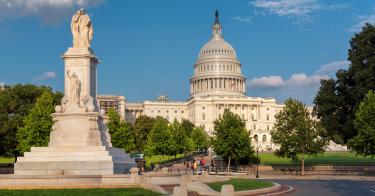Having launched tariff battles against China and other "unfair traders," the Trump administration is now trying to revive trade subsidies for them. Both moves will damage the U.S. economy, unless Congress intervenes.
The trade subsidies at issue are financial instruments that the U.S. Export-Import Bank provides to a select group of foreign companies and governments to subsidize their purchases of U.S. exports. China, Mexico and Canada ranked among the biggest beneficiaries in previous years.
During the past three years, however, the bank has lacked a president and a board quorum — and therefore been barred from issuing export loans and credit guarantees in excess of $10 million. That has meant less taxpayer-backed financing for a cadre of multinational corporations and foreign governments that otherwise constitute Ex-Im's biggest beneficiaries.
President Trump evidently is now convinced that the bank should return to full operation. He recently added a former Treasury official to a slate of board nominees that, if confirmed by the Senate, would restore Ex-Im's quorum. The bank would then be able to resume doling out multimillion dollar subsidies to foreign competitors of U.S. businesses.
China routinely ranks among the top beneficiaries of Ex-Im's largesse. For example, government-controlled Air China received more than $1.8 billion in Ex-Im assistance between 2007 and 2013, and some $4.5 billion in export loans and credit insurance from Ex-Im to Chinese firms remains outstanding.
Pemex, Mexico's national petroleum company, received $7.3 billion in Ex-Im assistance in the same period. And there remains $6.5 billion in ongoing assistance among various Mexican companies.
This American generosity is clearly at odds with the president's repeated assertions that China, Mexico and Canada are taking advantage of the United States, and his insistence on renegotiating NAFTA and the recent imposition of tariffs.
To be fair, the president may think that tariffs and export subsidies don't conflict — that one serves to block imports while the other props up (select) domestic exports. The reality, however, is quite different.
Taken together, these policies punish American consumers of foreign goods — many of whom are U.S. manufacturers who may have to lay off workers — while rewarding Chinese consumers and manufacturers. Call it the "Make Other Countries Great Again" policy.
And then there is the issue of Trump's board nominee, Kimberly Reed.
She has lamented the hamstringing of Ex-Im, characterizing it as "unilateral disarmament" in the world of export subsidies. However, the "disarmament" argument presumes that such subsidies are necessary to compete.
In fact, there is no shortage of private export financing.
Indeed, the vast majority of U.S. exports — 98% — do not receive assistance from the bank. Nonetheless, U.S. exports exceeded $2.35 billion in 2017 — the second largest volume in nearly a half century.
Ex-Im is cronyism incarnate. Between 2007 and 2014, more than 65% of the bank's subsidies benefited just 10 U.S. corporations. Yet those companies — Boeing, General Electric, Bechtel among them — hardly lack access to capital. Many of these companies are themselves sources of financing for global products.
The bank's foremost beneficiary has long been Boeing, the world's largest aerospace company, with a market cap of nearly $207 billion. Despite the absence of major Ex-Im Bank financing for its foreign customers, Boeing still managed (somehow!) to generate $93.4 billion in revenue last year on a record 763 commercial deliveries. The company's backlog remains robust at $488 billion, including a record 5,864 commercial aircraft.
At the same time, Boeing's own financing arm — the Boeing Capital Corporation — holds a gross customer finance and investment portfolio of more than $3 billion. According to the company's 2017 annual report, "(W)e expect alternative financing will be available at reasonable prices from broad and globally diverse sources."
The benefits provided by the bank impose costs on the rest of America. Foreign recipients of the bank's subsidies gain an artificial competitive advantage over domestic firms that go without the discount financing. Taxpayers, for their part, are on the hook for bank losses not covered by its reserves.
Ex-Im Doesn't 'Level' Playing Field
Ex-Im revivalists warn that foreign export-credit agencies (China's, in particular) will overtake America's bounty of entrepreneurial advantages. They incessantly refer to the need for "a level playing field." But there is no such thing. As the principle of comparative advantage holds, every country possesses advantages that others lack. The notion that the U.S. Ex-Im will balance the playing field of global trade is absurd.
Finance costs are only one among a variety of factors that affect a purchaser's choice of supplier. Availability, reliability and stability all play significant parts in purchase decisions. It's preposterous to worry that U.S. firms are incapable of competing successfully without corporate welfare.
In addition to Ms. Reed's confirmation, the bank still needs two new board members to create a quorum — without which the bank will remain barred from approving any transaction over $10 million. Congress reauthorized the bank's charter through September 30, 2019, and it continues to process financing for smaller deals.
There is no justification for the Senate to return Ex-Im to full operation. Export subsidies yield more harm than benefit to consumers and the companies that employ them.
This piece originally appeared in Investors Business Daily



